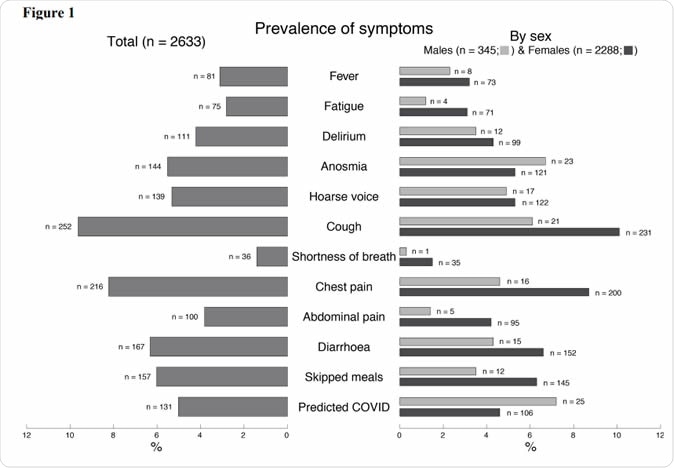The public health study analyzed data collected through the COVID-19 Symptom Tracker app launched last month, which allows members of the public to record the course of their illness. Over 2.7 million users downloaded the app, providing a vast database. Many of them have been tested for the illness.
.jpg)
Novel Coronavirus SARS-CoV-2 This scanning electron microscope image shows SARS-CoV-2 (yellow)—also known as 2019-nCoV, the virus that causes COVID-19—isolated from a patient in the U.S., emerging from the surface of cells (pink) cultured in the lab. Image captured and colorized at NIAID's Rocky Mountain Laboratories (RML) in Hamilton, Montana. Credit: NIAID
The team used machine learning algorithms to identify the combination of symptoms that would show the person's chances of being infected.
Twin study to reflect heritability of symptoms
In a parallel study, the team focused on over 2,600 twins in the UK between March 25 and April 3, 2020, asking them to report the symptoms they experienced, if any. The twin subjects are already a part of another research project, the TwinsUK adult twin register.
The investigators analyzed their self-reported symptoms to discover if they had anything in common, thus correlating COVID-19 symptoms with genetic makeup. This included 'Predicted COVID-19' status – an algorithm to predict true COVID-19 infection – which was determined by a 'linear combination of self-reported age, sex and symptoms of anosmia, severe or significant persistent cough, fatigue and skipped meals."
Identical twins have almost identical genetic makeup - they share nearly 100% of their genes, while non-identical twins share around half their genes. Professor Tim Spector, a member of the research team from King's College, clarified that they want to detect the similarity in symptoms between twins, to tease out the genetic contribution to the clinical features of the illness.
They also adjusted for common environmental factors due to living in the same household, in relevant cases. This helps understand if a person's genome is responsible for how they respond to the infection. If genetics did play a role, researchers would expect to see identical twins have nearly identical symptoms and less symptom similarity between non-identical twins. And that's basically what happened.
What did the study show?
The team's preliminary findings concluded that genetics determined about 50% of COVID-19 symptoms. Some symptoms which were tracked to a specific genetic influence were fever, diarrhea, delirium, and loss of taste and smell.
About 41% of the chances of developing fever as a result of the illness was due to the genetic predisposition, 47% of anosmia, 49% of delirium, and 50% of the symptom constellation of 'Predicted COVID-19'. Other symptoms with a heritability component include fatigue (32%), shortness of breath (43%), and diarrhea (34%).

Prevalence of symptoms “Predicted covid-19” status reported by 2633 twins. MZ represents monozygotic; DZ dizygotic twins.
When calculated for twin pairs not living together, the estimates were similar, with a significant increase for diarrhea to 41% and a decline in delirium to 37%.
However, a cough, hoarse voice, loss of appetite (skipped meals), chest pain, and abdominal pain could not be explicitly linked to an individual's genes.
The importance of genetic predisposition
Spector says this shows that the disease doesn't randomly affect people. Rather than severity and likelihood of infection being linked to a person's location or contacts, the individual's genetic and constitutional makeup seems to be an important factor. This is probably mediated by the variability in the immune response, which could also, via T cell activation and inflammatory mediator release, be linked to the occurrence of a cytokine storm 1-2 weeks after the onset of symptoms.
The study has significant implications, raising questions on precisely which genes control infection and symptom severity. Spector says, "I think you can say that your likelihood of getting it at all or getting it severely, is under some genetic control."
Why are the results important?
The results could help scientists in countries around the world look closely into which genes predict how some individuals don't get the illness at all or only develop mild symptoms. Identifying whether a person's genetic makeup puts them at risk or protects them could help public health authorities shield potentially vulnerable individuals from infection, as well as aid in the development of drug therapies.
"Understanding how symptoms of COVID-19 pass through the population may indicate the pathogenic mechanisms of SARS-CoV-2 infection, as well as offering utility in the allocation of scarce healthcare resources, particularly intensive care beds," the team stated in the paper, which has not yet been peer-reviewed.
Spector noted that the immune system and the gut microbiome were closely linked to genetic makeup as well, which could help explain why genetics seems to control the course of the disease. He added that the finding "reassures everyone" that it is "worth exploring this whole triangle of genes, immune system, and gut microbes."
Important Notice
medRxiv publishes preliminary scientific reports that are not peer-reviewed and, therefore, not be regarded as conclusive, guide clinical practice/health-related behavior, or treated as established information.